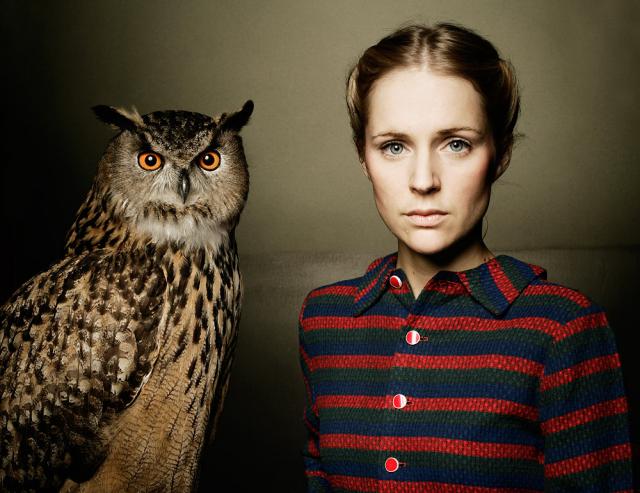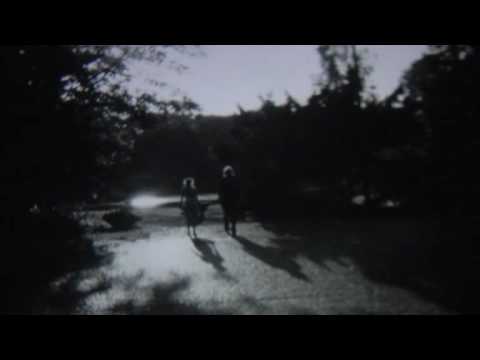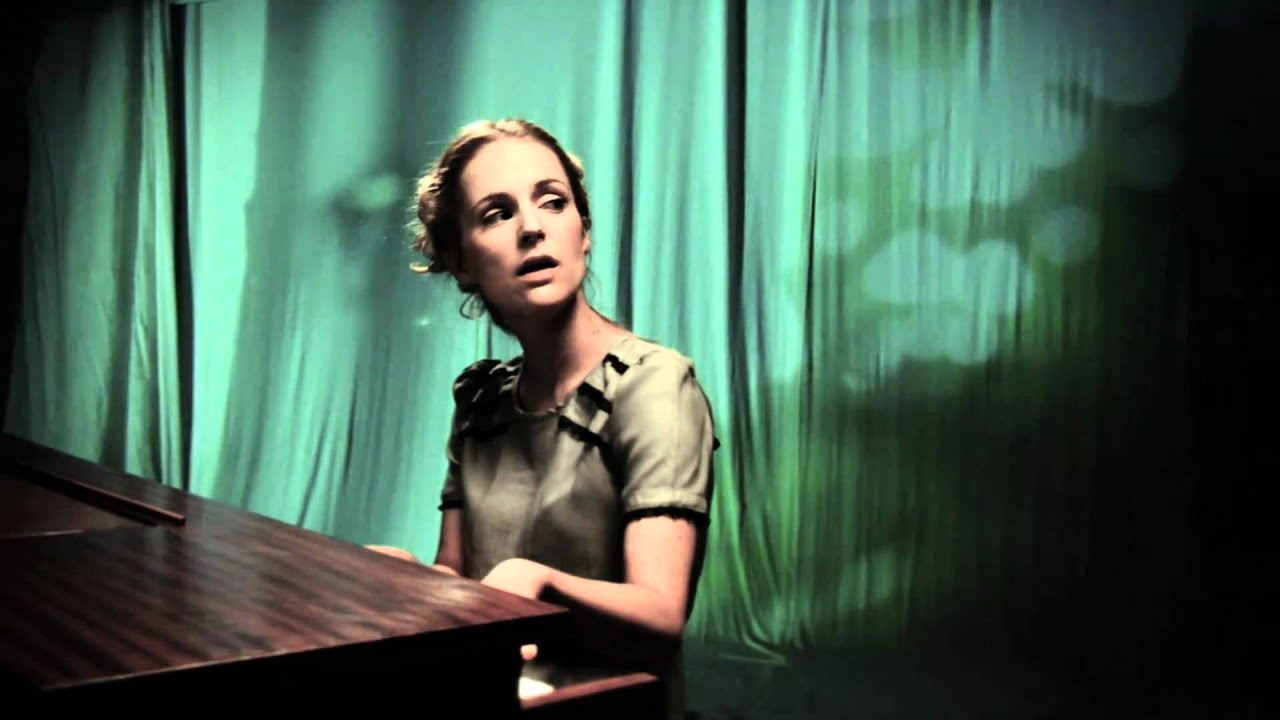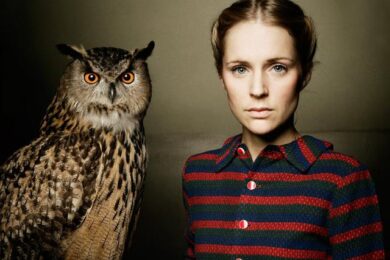It’s a typical early summer afternoon in the German capital, a clear blue sky splattered with brooding clouds. In the back garden of a typically eccentric Berlin café – with a caravan and garden shed available for overnight stays – a typical musical journalist is trying to have a typical conversation with a typical musician, attempting to draw parallels between her work and her personality, something which occasionally, typically, is making the musician squirm.
There’s nothing combative about the conversation: both know that they’re engaged in something that is probably taking place in countless cafés, bars and clubs around the world, a necessary part of the process of trying to make a living from the business of music. And yet, at the same time, both know that the process is somewhat futile. The music journalist has an hour in which to unlock the secrets of the musician’s work and make it interesting to readers, and the musician in turn needs to communicate enough to intrigue the journalist or else the promotional opportunity will have been wasted. Another day in the life…
Agnes Obel was turning 30 as she released her first solo album, Philharmonics, last year, its dozen songs largely centred around delicate piano melodies and a voice that rarely rises above a pillow talk whisper. Written primarily for her own pleasure, the songs weren’t considered appropriate for the bands with whom she played, and in years past might not have made it beyond the walls of her apartment. But, like nearly every musician active in the 21st century, Obel uploaded a bunch of tunes to Myspace, that infinite catalogue of sound amid which millions of dreams wither and die. By chance, one of them was somehow stumbled upon by – and deemed suitable for the purposes of – the agency commissioned to market Deutsche Telekom, owners of T-Mobile, in Germany. Before long, prospective owners of ‘Das T-Mobile G1 mit Google’ were being seduced by the sight of a young couple reunited beneath a shower of flower petals soundtracked by the fragile strains of Obel’s ‘Just So’. As these things go, it was a touching, impressively sentimental 43 seconds, the capitalist interests of Europe’s biggest telecommunications company softened by the illusion that all they really want to do is bring people together. The people were moved. The advertisement worked. But it worked best for Agnes Obel. Which makes the music journalist, as a thoroughly dissatisfied customer of Deutsche Telekom, like her that little bit more.
18 months later, she’s the proud, if surprised, creator of an album that has, since its release, gone double platinum in her native Denmark and platinum in France. The UK has been slower to react, but that’s probably a relief. The woman is obviously overwhelmed: she’s late for her appointment, even though they’re meeting very close to her home; she only just returned from the US; she needs to record a track for a film tomorrow; she’s back on the road the day after. The album release campaign has already taken her from the mayhem of Austin, Texas’ South By South West convention to the more subdued surroundings of the World Expo in China. She’s played in a converted nineteenth century theatre a short walk from her Berlin apartment, performed beneath the altar of an ornate nineteenth century Gothic church in Oslo, and charmed I Am Kloot’s audience in London’s Union Chapel. And, even now, as the musician and journalist order cups of tea, sales of her debut album continue to grow.
An insider, the music journalist tells her, says PIAS initially budgeted the album for worldwide sales of 15,000. He says it’s now reached 250,000 copies.
"Yeah," she says, and then pauses, staring out towards the back of the café garden and then shyly down at the ground beneath her. "It’s even more, I think. It’s unbelievable…"
It is indeed hard to believe. Occasionally bashful and always down to earth, Obel is not an obvious star, even though she’s elegant and camera-friendly. She’s one of those musicians that never sought to do much more than please herself, only to find that the results were pleasurable for a considerably larger audience than she might ever have imagined, something that’s especially surprising since her music initially seems unprepossessing: it’s so mild as to be instantly forgettable, except that, over a handful of plays, it creeps up on you until every note is familiar and welcome. Unrecognised by those drinking latte macchiatos at the tables around us, she pulls a thin black cardigan around her shoulders, ostensibly to warm herself against a steadily growing breeze, but it could also be one of those subconscious signs of nervous self-protection into which music journalists like to read meaning.
The album’s success has been a shock, she admits. "I didn’t really expect anything, and I kind of had this feeling that my label felt the same way. And then the album got released in Denmark and all of Europe while I was on tour, and then suddenly it just went crazy. I got more and more emails, and more and more things, and then I had to continue, continue, continue, and suddenly a whole month of concerts were totally sold out. I couldn’t believe it. I was like "Whaaaat?! What’s going on here?!" So that was like a big shock. To everyone, of course.
"I remember I was playing Eurosonic," she continues after another thoughtful pause, "and I had one big concert planned, and then, the day after, one more. I was very sick there: I’d never tried to tour like this before, so I didn’t know my limits, and I discovered my limit in January. I cancelled the first concert, and then for the second one, when I was really sick, there was a big queue outside and I could feel, ‘OK, this is Holland, and it seems like it’s spreading. It’s not just in Denmark or France.’"
Did you feel like you were losing control, the music journalist asks, prodding for a little more honest insight into the frail state of the musician’s mind.
"Yeah," she nods slowly. "Of course, if you’re used to do everything yourself and have compete control about everything and suddenly there’s people in London and Brussels and Paris sending emails and duh, duh, duh, and suddenly, ‘You have to do that’, and the next day something is released… It goes very fast, a totally different way of working. There’s much more people involved in everything around it, and that’s new for me, really new. But it’s also fun. I have travelled and travelled and travelled. And travelled and travelled and travelled…"
The music journalist is briefly disappointed by the musician’s positive spin on events. Obel seems grounded, despite the whirlwind growing around her, but he can’t help wondering if it’s a front. He’d seen her perform a year earlier, when she’d appeared nervous and self-conscious in front of a sizeable audience who’d come to see the taping of a TV show. "What was the most embarrassing moment of your life?" the host had asked, in German. "This," she’d giggled awkwardly, aware of her still limited linguistic abilities. So the music journalist pursues her for signs of vulnerability: has she suffered a lot from nerves?
"I have…" she stutters, "quite a lot… because I never expected to go out and play live with these songs. It was just my intention to make an album. It was just something I played on my own. So I was not really prepared to go out and sing for so many people. I had some really bad shows where I was really afraid. I wasn’t crawling under the piano, but I was sitting there thinking, ‘Why am I doing this?’"
Aha, the music journalist thinks, she’s one of those: a musician who writes for themselves to get rid of demons and articulate their emotions, and in so doing inadvertently strikes a chord with the world at large which she is then obliged to serve. The precise meaning of her songs is elusive, so their location and sensibilities remain vague enough to allow personal interpretation. But they must surely shed light on her inner being. Is her music confessional, he asks?
"No," she replies. "I don’t think it is. At all. It’s maybe confessional in that it’s something I always do on my own, and it means something really private to me, but the lyrics are inspired by the music. That’s why I don’t feel like they’re confessional. Of course they will reflect something of me, because they’re coming from me and there’s a reason why I think of them, but… I have a very clear picture of what they’re about, actually.
"Well, some of them I didn’t know it, but I see it now, and some of them I was thinking about a person and I could describe things from their perspective. In ‘Riverside’ I’m describing the piano, because I felt like it sounded like water, and then… I don’t know what else was going on there. But then there’s another song I was thinking about a friend of mine, he’d just died. He was only 27, so it was really horrible. So I have some really concrete things that I’m thinking about, but then there are some other lyrics where I really didn’t know what I was writing about. Sometimes I don’t get any lyrics at all, and I don’t have any subject in my mind or anything that’s really going on in my life that I think also fits to the melody, and then I leave the song until I find something that I feel fits."
Are there any lyrics of which she’s especially proud, the journalist enquires?
"I really like the lyrics to ‘Philarmonics’," she explains rationally, "because I feel like they fit very well to the right hand. For me it’s the perfect translation of the right hand into words."
This, obviously, is not how Elvis Costello would put it.
But even if the lyrics don’t have an intense personal resonance, the journalist thinks, the music itself must still come from somewhere deep inside. You can’t write something this emotive without it coming from the heart, and it’s apparently the journalist’s job to shed light on what makes it beat. So, Ms Obel, what inspires you?
"I don’t go out and seek inspiration," she responds. "I think I get my inspiration from the melody. Sometimes I feel like a melody doesn’t have anything to do with me, but it’s just something that comes, is accumulated from me playing on the piano, and then this little creature just appears." She giggles quietly. "Then I just follow it, and I don’t feel like I’m making it. It’s like it makes sense, it wants to go that way, and I feel like sometimes there’s a story in it, a little story. Maybe the right hand is playing something and the left is like, ‘Oh. It’s saying something.’ There’s a certain atmosphere and mood to it."
Perhaps the music isn’t indicative of her character after all, the music journalist grudgingly accepts, and Obel is merely a trained musician capable of crafting songs that pluck the heartstrings in much the same way as Deutsche Telekom manage with 45 seconds of carefully manipulated images. But that can’t be, he reconsiders. Music is a window into the soul. Maybe the polite restraint of her album is instead symptomatic of a tempestuous character seeking order in her emotional life. Is the music you write reflective of your character, he persists, or do you lose your temper from time to time?
"Oh yeah!" she laughs before a pensive mood settles upon her. "I don’t know… I think it’s weird, comparing the music you’re doing with your personality. I have a temper, and I think my music is just showing a weakness for a certain kind of melodic universe and production. It doesn’t reflect me like a mirror. But of course it reflects something of me which I don’t show publicly."
The music journalist senses blood. Do you find this process intrusive, he continues, or is it completely irrelevant?
"I’m not so interested when I’m reading interviews," Obel replies calmly. "When someone plays some music that interests me, I think ‘OK, he’s really good, or she’s really good’. Of course it’s part of them, and of course things in their life will be reflected in their music, but I don’t see this as a complete mirror. I understand why people want to think that, especially when it’s a solo person, and their name is on the record. But there were these big geniuses who made beautiful music and they were horrible people, and there can be beautiful people who make terrible music."
The music journalist realises, to his surprise, that though Obel seems unlikely to give much more away, he’s rather enjoying her company, in much the same way as he’s enjoyed her record. Perhaps it is still, despite what she says, reflective of her personality, but not in a direct way, not via the traditional correlation between tragedy and art that insists that a person’s work is informed by their personal history. She’s a quiet, charming soul, and her music reflects that, but to draw further parallels would be stretching it. He wonders why this instinctively leads him to question the validity of her art, as though it’s worth less because it isn’t a direct result of suffering. Surely there’s something that drives her, something that inspired her to begin writing in the first place. Self-validation, perhaps? The need for approval? Do you worry, he asks, about what other people think of your work? Do you read the reviews, for instance?
"No," she states firmly. "They all say different stuff. In the beginning I was really nervous about reviews and stuff, but I also got a lot of really good reviews and then you find out, you meet some of these people sometimes… It’s like, if you take this so seriously, when you’ve been working so hard on something, it’s really a waste of time. Of course it’s important, but I don’t really listen to it, and now I’ve stopped reading it completely. Also, before I had much more respect for it. This has really gone out of the window. There are some I know where I share the same music taste. Otherwise I don’t care. It was a Danish singer who told me many years ago, ‘Never read it, because it’s just destructive’. If you have to put your blood and sweat and work into something and then put it out there, and then just read all the responses you’re getting, this is not healthy. It’s maybe fun to a certain extent, but then it’s really dangerous. I feel like you should focus down to something that’s yours. Otherwise you end up never making anything."
The music journalist and musician part on friendly terms. It’s been an unusual interview, the journalist thinks: calm, thoughtful, open and unpretentious. Whether or not these qualities are connected to her music, he looks forward to listening to her album again in the light of their chat. Its warm simplicity is comforting, its sentiments inclusive, its atmosphere unobtrusive. It doesn’t hustle for attention. It avoids cheap, hackneyed drama. It came into being because Obel gave the notes life, and it exists beyond her immediate world because those notes were lucky enough to be heard by others and subsequently embraced. Obel herself seeks little credit for this, and seems curiously detached from the process: an enabler, a facilitator, a conduit, content to let the music speak for itself. Music: for music’s sake.
As the music journalist reads through the transcription of their meeting later that evening, Philharmonics playing quietly in the background, he finds himself drawn away from the page, over and over again, in favour of the desolate, reflective yearning of Obel’s music. It isn’t, he realises, that nothing she’s said is of interest. In fact, he admits, he’s enjoying the songs all the more now that he’s met her. And then he recognises why that might be: she has allowed the record to represent a blank canvas upon which we can project our own emotional responses. No doubt her personality has crept into its melodies, into its simple phrasings, probably into each stroke of the piano key. But she hasn’t defined it. She has let it define itself, and left us to discover its meaning, or perhaps even to invent one.
That, the music journalist decides, is why it sounds so pure.
That, the music journalist reasons, is why its presence in his heart grows with each and every play.
That, the music journalist concludes, is far from typical.





